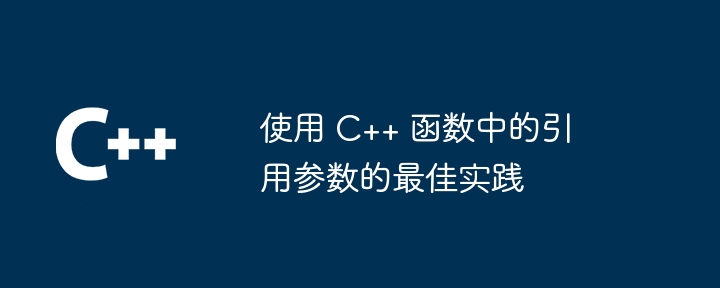Home >Backend Development >C++ >Best practices for using reference parameters in C++ functions
Best practices for using reference parameters in C++ functions
- WBOYWBOYWBOYWBOYWBOYWBOYWBOYWBOYWBOYWBOYWBOYWBOYWBOriginal
- 2024-04-21 09:33:021041browse
It is important to follow best practices when using reference parameters in C: always pass a non-null reference. Clearly identify reference parameters. Limit modifications to reference parameters. Avoid passing reference parameters to functions. Don't return references to local variables.

Reference Parameters in C Functions: Best Practices
In C, reference parameters allow a function to modify the parameters passed by the caller. original variable. By avoiding duplication, they increase efficiency, but also introduce potential pitfalls. When using reference parameters, it is important to follow the following best practices:
1. Always pass a non-null reference:
Make sure that the variable passed to the reference parameter is valid and non-null. Passing a null reference causes undefined behavior.
2. Clearly identify reference parameters:
Use prefixes such as &, const & or *& to clearly indicate that function parameters are references. This helps avoid accidental modifications.
3. Limit modifications to reference parameters:
Only modify reference parameters when necessary. Try to avoid making significant modifications to reference parameters in functions.
4. Avoid passing reference parameters to functions:
If a function does not need to modify the variables passed by the caller, do not pass references. Instead, pass a copy to prevent accidental modification.
5. Do not return references to local variables:
When a function returns a reference, please ensure that it refers to an object outside the scope of the function. Returning a reference to a local variable results in a dangling reference.
Practical case:
Consider a swap() function that swaps two integers:
void swap(int &a, int &b) {
int temp = a;
a = b;
b = temp;
}In this example , a and b are reference parameters, and the swap() function can efficiently modify the original integer. This technique avoids the overhead of copying twice the integer.
Note:
Abuse of reference parameters can lead to problems that are difficult to debug. Always carefully consider the need to use reference parameters and follow best practices to avoid unexpected errors.
The above is the detailed content of Best practices for using reference parameters in C++ functions. For more information, please follow other related articles on the PHP Chinese website!

